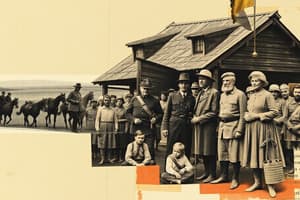Podcast
Questions and Answers
What is economic history?
What is economic history?
- A field of study that uses both quantitative data and qualitative sources to understand the historical context in which major economic events take place. (correct)
- A field of study that only uses qualitative sources to understand the historical context in which major economic events take place.
- A field of study that focuses on the institutional dynamics of systems of production, labor, and capital.
- A field of study that only uses quantitative data to understand the historical context in which major economic events take place.
What are the sub-disciplines of economic history?
What are the sub-disciplines of economic history?
- Financial and business history, New Economic History or cliometrics, and history of socialism.
- Financial and business history, New Economic History or cliometrics, and history of capitalism. (correct)
- Financial and business history, New Economic History or cliometrics, and history of communism.
- Financial and business history, New Economic History or cliometrics, and history of feudalism.
What is cliometrics?
What is cliometrics?
- The study of the impact of the economy on society, culture, and language.
- The systematic use of economic theory and econometric techniques to the study of economic history. (correct)
- The study of the institutional dynamics of systems of production, labor, and capital.
- The study of the historical context in which major economic events take place.
What is the historical school of economics?
What is the historical school of economics?
What is the new field called "history of capitalism"?
What is the new field called "history of capitalism"?
What is the Economic History Review?
What is the Economic History Review?
Who are some notable economic historians?
Who are some notable economic historians?
What are some notable works in financial history?
What are some notable works in financial history?
What are some notable works in globalization and inequality?
What are some notable works in globalization and inequality?
Flashcards are hidden until you start studying
Study Notes
Economic History: A Study of History Using Methodological Tools from Economics or with a Special Attention to Economic Phenomena
-
Economic history is a field of study that uses both quantitative data and qualitative sources to understand the historical context in which major economic events take place.
-
Economic historians focus on the institutional dynamics of systems of production, labor, and capital, as well as the economy's impact on society, culture, and language.
-
The field has several sub-disciplines, including financial and business history, New Economic History or cliometrics, and history of capitalism.
-
The historical school of economics, which dominated German and French scholarship for most of the 20th century, argued that there were no universal truths in history, emphasizing the importance of historical context without quantitative analysis.
-
Cliometrics, also known as the New Economic History, refers to the systematic use of economic theory and econometric techniques to the study of economic history.
-
Economic history has been integrated into either history or economics departments in the UK and the US, with only the LSE retaining a separate economic history department.
-
Economic history remains an active field of social scientific inquiry, with a resurgence in interest since 2000, driven by research conducted at universities in continental Europe.
-
Economic history has seen a growth in the study of big policy-relevant questions on the history of economic growth and development, including persistence studies.
-
A new field, called "history of capitalism," has emerged in US history departments since about the year 2000, focusing on the contribution of slavery to the rise of the US economy in the nineteenth century.
-
The field of economic history has been critiqued for its lack of social scientific methods and its ideological biases, leading to the founding of a new academic journal, Capitalism: A Journal of History and Economics, to widen the scope of the field.
-
The Economic History Review, founded in 1927, was the first journal specializing in the field of economic history, followed by The Journal of Economic History.
-
Economic history has several academic societies, including the Economic History Society in the UK, the Economic History Association in the US, and the European Historical Economics Society.Overview of Economic History: Key Organizations, Notable Works, and Nobel Prize Winners
-
The Economic History Association was founded in 1941 and aims to provide new perspectives in economics and history.
-
The International Economic History Association recognizes major academic organizations dedicated to the study of economic history, including the Business History Conference and the Economic History Society.
-
Several Nobel Prize-winning economists have contributed to economic history or have made contributions to economics that are commonly applied in economic history.
-
Foundational works in economic history include works by Adam Smith, Karl Marx, and Max Weber.
-
Notable works in general economic history include "The Wealth of Nations" by Adam Smith and "Capital" by Karl Marx.
-
Notable works in ancient economies include "The History of the Peloponnesian War" by Thucydides and "The Ancient Economy" by Moses Finley.
-
Notable works in economic growth and development include "The Stages of Economic Growth" by W.W. Rostow and "The End of Poverty" by Jeffrey Sachs.
-
Notable works in the history of money include "The Ascent of Money" by Niall Ferguson and "The Origins of Money" by Carl Menger.
-
Notable works in business history include "The Visible Hand" by Alfred Chandler and "The Company and the Shogun" by Adam Clulow.
-
Notable works in financial history include "The House of Morgan" by Ron Chernow and "The Great Crash, 1929" by John Kenneth Galbraith.
-
Notable works in globalization and inequality include "The Bottom Billion" by Paul Collier and "Globalization and Its Discontents" by Joseph Stiglitz.
-
Notable economic historians include Douglass North, Robert Fogel, and Claudia Goldin.
-
The interdisciplinary nature of economic history has led to the development of related academic journals, including the Business History Review and the European Review of Economic History.
Studying That Suits You
Use AI to generate personalized quizzes and flashcards to suit your learning preferences.



